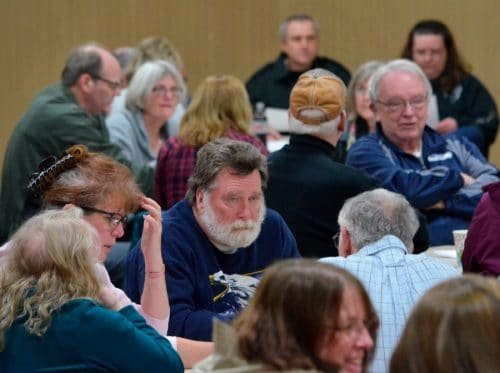 Neighbors discuss strategies at a town hall meeting on crime. Photo: Lisa Bryan, KP News
Neighbors discuss strategies at a town hall meeting on crime. Photo: Lisa Bryan, KP News
Nearly 80 people gathered at the Key Peninsula Civic Center Jan. 29 to discuss crime on the KP. The meeting, sponsored by Safe Streets, was designed to identify problems and create strategies to solve them.
RoxAnne Simon and Wanda Rochelle of Safe Streets made introductions and Chuck West, president of the Key Peninsula Community Council, moderated. The evening included small group discussions, followed by a question-and-answer session with Lt. Randy Wilder of the Pierce County Sheriff’s Department, county Councilman Derek Young and county Prosecuting Attorney Mark Lindquist.
“The large turnout made it clear to our law enforcement and elected representatives that crime in our community is an important issue,” said Susan Paganelli, director of the Key Peninsula Partnership for a Healthy Community.
Individuals wrote questions on cards, which were then read aloud for the panel. Panelists focused on understaffing at the sheriff’s department, concerns about how quickly offenders are back on the street after they are apprehended, and the problem of homelessness.
Both Wilder and Young agreed that the sheriff’s department is understaffed.
Young said that the shortage of staff on the Key Peninsula is due not to population growth but to cuts made during the economic downturn a decade ago. The department, which serves all of unincorporated Pierce County, is currently short 60 full-time equivalents, including commissioned and noncommissioned staff. He said that the legislated limits on property tax, combined with unfunded mandates, have contributed to the funding problem. He is optimistic that the new internet sales tax, recently approved by the state, will bring revenue to help pay for positions.
According to the Pierce County website, the general fund, which is 31.5 percent of the total county budget, receives unrestricted county revenue to finance the majority of the traditional services associated with county government. About 76 percent of that fund goes to law enforcement and judicial services. The 2018 budget increased the number of staff both in the sheriff’s department and in the prosecuting attorney’s office.
Wilder said that despite short staffing, once a deputy is contacted by the dispatcher, the average response time is 15 minutes.
Lindquist and Wilder addressed the concern of what some in the audience referred to as “catch and release.” Lindquist said that anyone arrested has a constitutional right to bail. Pierce County has relatively low bail for property crimes. “But if someone is released on bail, it does not mean he is not being held accountable. He faces a trial and sentencing,” he said.
Lindquist also described the new high-priority offender program, which targets felony-level repeat offenders. For those offenders, bail is set high and sentences are relatively long.
Wilder said that videos provided from homeowners’ surveillance cameras have helped identify thieves. He explained that at times, his deputies may decide to issue a warning rather than make an arrest, especially if the suspect is not a repeat offender. They may judge that it is more important to be available to answer critical calls or assist their fellow deputies than to take the time to transport and book the suspect.
Wilder and Young acknowledged the frustration of removing people from vacant or abandoned property. Wilder said that homelessness, mental health and drug use are all closely interconnected. Young said that the civil process of removing people when the owner is not present is unwieldy. A new civil nuisance law, just recently passed, will allow the sheriff to remove squatters after just three phone calls.
Some participants expressed disappointment that the event did not focus on finding solutions. “It was worth coming to, but I was kind of frustrated. I would have liked to have more questions answered,” Cynthia Perry said.
Emme McAbee was frustrated that the questions from the audience were summarized and didn’t include the full content, including some viable solutions to problems. She was concerned that misdemeanor crimes are not given enough attention. “Misdemeanors grow,” she said. “They are almost a gateway drug to bigger crimes.”
Although the organizers hoped to concentrate on solutions, both Simon and Rochelle said that there were so many questions from the group that they decided to shift the emphasis of the meeting to providing answers.
Simon will be posting the notes from the discussion groups.
Safe Streets will schedule follow-up town halls. The next one will focus on solutions, with Wilder as facilitator. Young will host a meeting to discuss budget issues.
Meeting times will be advertised through flyers, Facebook, the KP News Community Calendar and by email. To add a name to the notification list, contact RoxAnne Simon at rsimon@safest.org.
UNDERWRITTEN BY THE FUND FOR NONPROFIT NEWS (NEWSMATCH) AT THE MIAMI FOUNDATION, THE ANGEL GUILD, ADVERTISERS, DONORS AND PEOPLE WHO SUPPORT INDEPENDENT, NONPROFIT LOCAL NEWS